Yiwen Yuan
Symbolic Representation for Any-to-Any Generative Tasks
Apr 24, 2025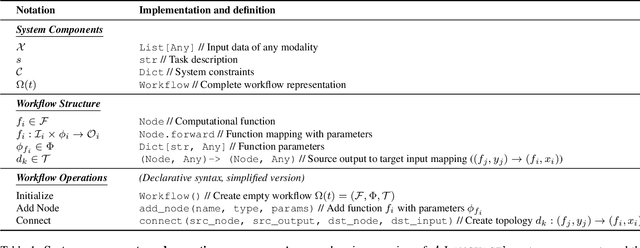
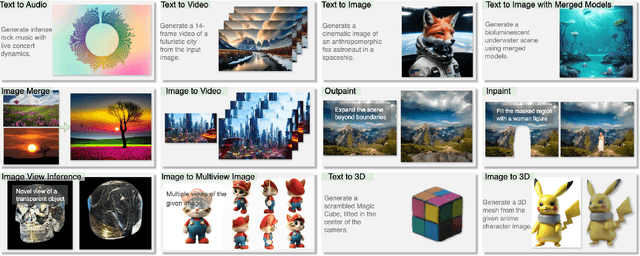
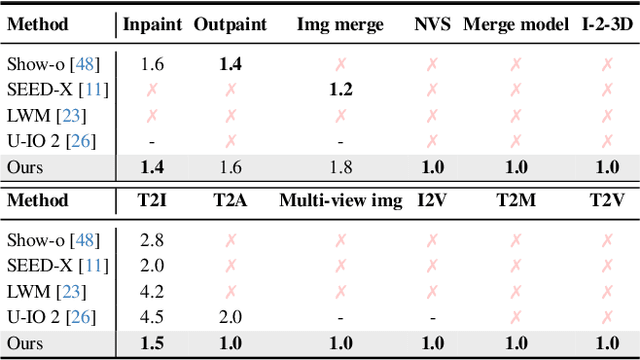

Abstract:We propose a symbolic generative task description language and a corresponding inference engine capable of representing arbitrary multimodal tasks as structured symbolic flows. Unlike conventional generative models that rely on large-scale training and implicit neural representations to learn cross-modal mappings, often at high computational cost and with limited flexibility, our framework introduces an explicit symbolic representation comprising three core primitives: functions, parameters, and topological logic. Leveraging a pre-trained language model, our inference engine maps natural language instructions directly to symbolic workflows in a training-free manner. Our framework successfully performs over 12 diverse multimodal generative tasks, demonstrating strong performance and flexibility without the need for task-specific tuning. Experiments show that our method not only matches or outperforms existing state-of-the-art unified models in content quality, but also offers greater efficiency, editability, and interruptibility. We believe that symbolic task representations provide a cost-effective and extensible foundation for advancing the capabilities of generative AI.
Video-Bench: Human-Aligned Video Generation Benchmark
Apr 07, 2025



Abstract:Video generation assessment is essential for ensuring that generative models produce visually realistic, high-quality videos while aligning with human expectations. Current video generation benchmarks fall into two main categories: traditional benchmarks, which use metrics and embeddings to evaluate generated video quality across multiple dimensions but often lack alignment with human judgments; and large language model (LLM)-based benchmarks, though capable of human-like reasoning, are constrained by a limited understanding of video quality metrics and cross-modal consistency. To address these challenges and establish a benchmark that better aligns with human preferences, this paper introduces Video-Bench, a comprehensive benchmark featuring a rich prompt suite and extensive evaluation dimensions. This benchmark represents the first attempt to systematically leverage MLLMs across all dimensions relevant to video generation assessment in generative models. By incorporating few-shot scoring and chain-of-query techniques, Video-Bench provides a structured, scalable approach to generated video evaluation. Experiments on advanced models including Sora demonstrate that Video-Bench achieves superior alignment with human preferences across all dimensions. Moreover, in instances where our framework's assessments diverge from human evaluations, it consistently offers more objective and accurate insights, suggesting an even greater potential advantage over traditional human judgment.
Imitate Before Detect: Aligning Machine Stylistic Preference for Machine-Revised Text Detection
Dec 22, 2024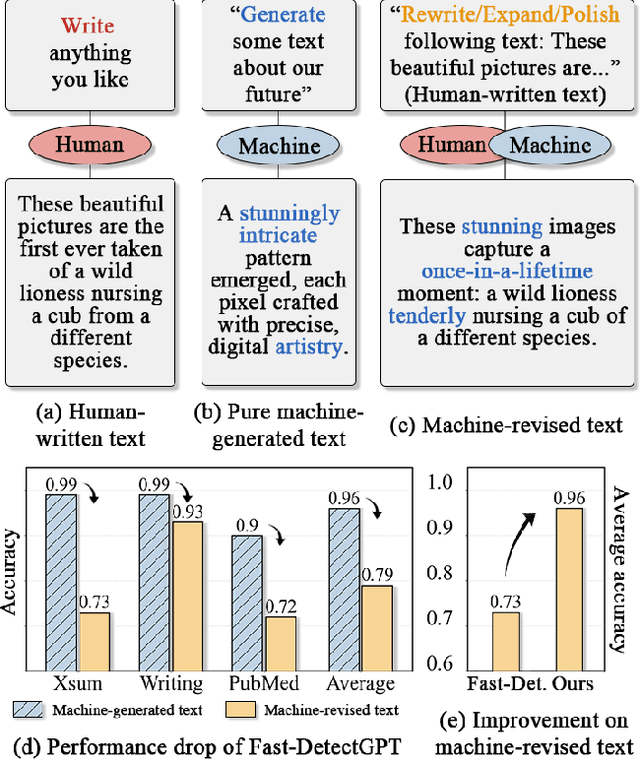
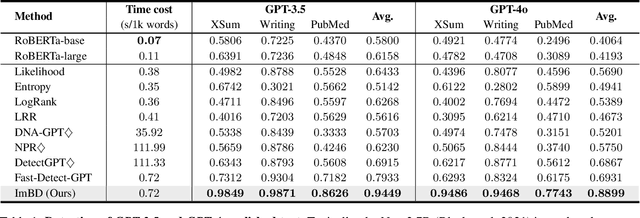
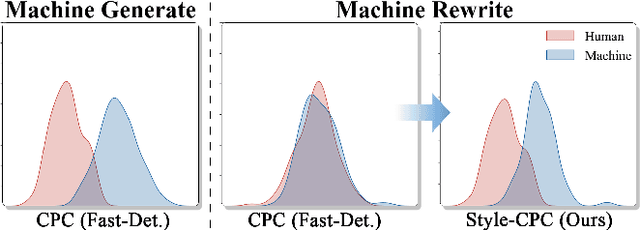

Abstract:Large Language Models (LLMs) have revolutionized text generation, making detecting machine-generated text increasingly challenging. Although past methods have achieved good performance on detecting pure machine-generated text, those detectors have poor performance on distinguishing machine-revised text (rewriting, expansion, and polishing), which can have only minor changes from its original human prompt. As the content of text may originate from human prompts, detecting machine-revised text often involves identifying distinctive machine styles, e.g., worded favored by LLMs. However, existing methods struggle to detect machine-style phrasing hidden within the content contributed by humans. We propose the "Imitate Before Detect" (ImBD) approach, which first imitates the machine-style token distribution, and then compares the distribution of the text to be tested with the machine-style distribution to determine whether the text has been machine-revised. To this end, we introduce style preference optimization (SPO), which aligns a scoring LLM model to the preference of text styles generated by machines. The aligned scoring model is then used to calculate the style-conditional probability curvature (Style-CPC), quantifying the log probability difference between the original and conditionally sampled texts for effective detection. We conduct extensive comparisons across various scenarios, encompassing text revisions by six LLMs, four distinct text domains, and three machine revision types. Compared to existing state-of-the-art methods, our method yields a 13% increase in AUC for detecting text revised by open-source LLMs, and improves performance by 5% and 19% for detecting GPT-3.5 and GPT-4o revised text, respectively. Notably, our method surpasses the commercially trained GPT-Zero with just $1,000$ samples and five minutes of SPO, demonstrating its efficiency and effectiveness.
ContextGNN: Beyond Two-Tower Recommendation Systems
Nov 29, 2024



Abstract:Recommendation systems predominantly utilize two-tower architectures, which evaluate user-item rankings through the inner product of their respective embeddings. However, one key limitation of two-tower models is that they learn a pair-agnostic representation of users and items. In contrast, pair-wise representations either scale poorly due to their quadratic complexity or are too restrictive on the candidate pairs to rank. To address these issues, we introduce Context-based Graph Neural Networks (ContextGNNs), a novel deep learning architecture for link prediction in recommendation systems. The method employs a pair-wise representation technique for familiar items situated within a user's local subgraph, while leveraging two-tower representations to facilitate the recommendation of exploratory items. A final network then predicts how to fuse both pair-wise and two-tower recommendations into a single ranking of items. We demonstrate that ContextGNN is able to adapt to different data characteristics and outperforms existing methods, both traditional and GNN-based, on a diverse set of practical recommendation tasks, improving performance by 20% on average.
RelBench: A Benchmark for Deep Learning on Relational Databases
Jul 29, 2024

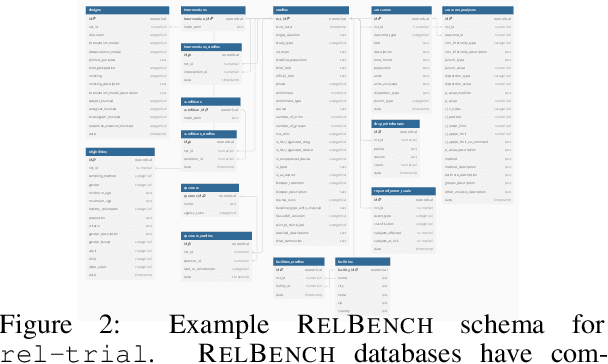

Abstract:We present RelBench, a public benchmark for solving predictive tasks over relational databases with graph neural networks. RelBench provides databases and tasks spanning diverse domains and scales, and is intended to be a foundational infrastructure for future research. We use RelBench to conduct the first comprehensive study of Relational Deep Learning (RDL) (Fey et al., 2024), which combines graph neural network predictive models with (deep) tabular models that extract initial entity-level representations from raw tables. End-to-end learned RDL models fully exploit the predictive signal encoded in primary-foreign key links, marking a significant shift away from the dominant paradigm of manual feature engineering combined with tabular models. To thoroughly evaluate RDL against this prior gold-standard, we conduct an in-depth user study where an experienced data scientist manually engineers features for each task. In this study, RDL learns better models whilst reducing human work needed by more than an order of magnitude. This demonstrates the power of deep learning for solving predictive tasks over relational databases, opening up many new research opportunities enabled by RelBench.
PyTorch Frame: A Modular Framework for Multi-Modal Tabular Learning
Mar 31, 2024



Abstract:We present PyTorch Frame, a PyTorch-based framework for deep learning over multi-modal tabular data. PyTorch Frame makes tabular deep learning easy by providing a PyTorch-based data structure to handle complex tabular data, introducing a model abstraction to enable modular implementation of tabular models, and allowing external foundation models to be incorporated to handle complex columns (e.g., LLMs for text columns). We demonstrate the usefulness of PyTorch Frame by implementing diverse tabular models in a modular way, successfully applying these models to complex multi-modal tabular data, and integrating our framework with PyTorch Geometric, a PyTorch library for Graph Neural Networks (GNNs), to perform end-to-end learning over relational databases.
 Add to Chrome
Add to Chrome Add to Firefox
Add to Firefox Add to Edge
Add to Edge